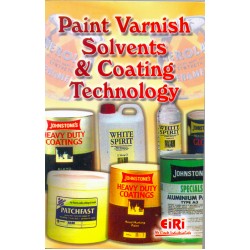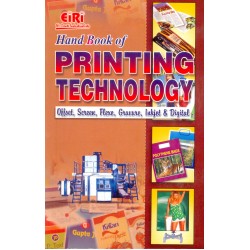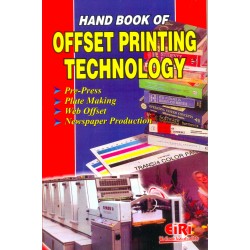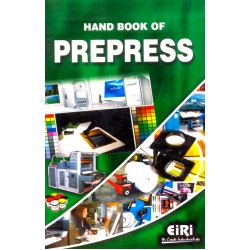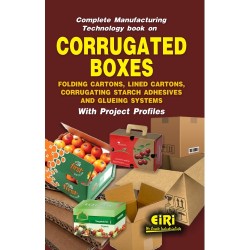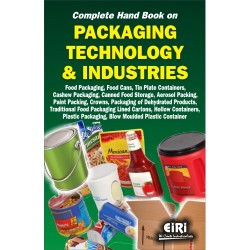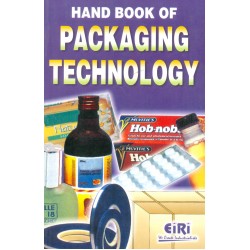hand book of screen printing with processes and technology
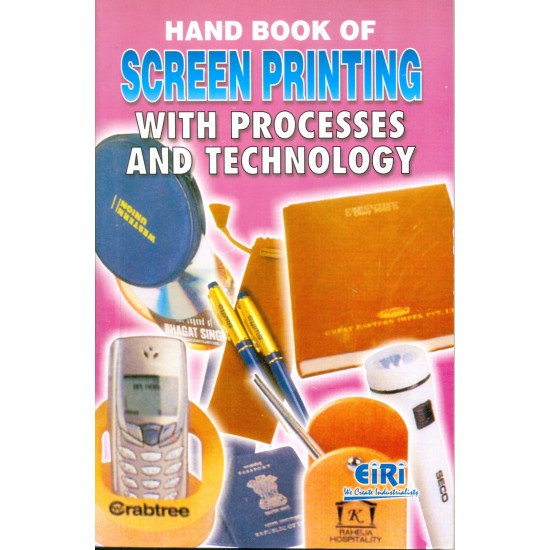
- More than 40 years of experience
- Managed by expert industrial consultants
- ISO 9001-2015 Certified
- Registered under MSME, UAM No: DL01E0012000
- 24/5 Research Support
Get your quesries resolved from an industry expert. Ask your queries before report or book purchase. - Custom Research Service
Speak to the our consultant to design an exclusive study to serve your research needs. - Quality Assurance
All reports are prepared by highly qualified consultants & verified by a panel of experts. - Information Security
Your personal & confidential information is safe & secure.
HAND BOOK OF SCREEN PRINTING WITH PROCESSES AND TECHNOLOGY
SCREEN PRINTING
The screen printing Press
Types of Fabrics
Construction of Fabrics
Mesh Count, Mesh Strength and Mesh Opening
Stretching the screen fabric
How to Build A Screen Process Press?
Step-1 Assemble Needed Materials
Bill of Materials
Step-2Construct the Frame
Step-3 Attach the screen fabric
Step-4 Tape and seal the screen
Step-5 Prepare the Base
Step-6 Hinge the frame
Step-7 Add a Frame Support
Print Dry Equipment
Constructing Speciality Equipment
SCREEN PRINTING ON PAPER TEXTILES AND OTHER PRINTING SUBSTRATES
Type of Paper
Textiles
Principal of Screen Process Printing Common Types of Paper
Color of Stock
Type of Fabric
Common Type of Fabrics
Printing on T-shirts
Plastics
Types of Plastics
Metals
Woods
Ceramics
SCREEN PROCESS STENCILS
Hand Cut Paper Stencils
Step-1 Image the Paper
Step-2 Cut the Stencil
Step-3 Adhere the Stencil
Hand cut film stencils
To prepare a Film Stencil
Step-1 Prepare for cutting
Step-2 Cut the Stencil
Step-3 Adhere the Stencil
Step-4 Remove the Backing sheet
Photographic Stencils
To Prepare an Indirect Photographic stencil
Step-1 Prepare for Exposure
Step-2 Load the Frame
Step-3 Expose the Stencil
Step-4 Develop the Stencil
Step-5 Wash out the Stencil
Step-6 Adhere the stencil
To Prepare a Direct Photographic Stencil
Step-1 Mix the Emulsion
Step-2 Coat the Screen
Step-3 Expose the Screen
Step-4 Process the Stencil
To Prepare a Direct/Indirect Photographic Stencil
Step-1 Sensitize the Coating Solution
Step-2 Adhere the Film to the Fabric
Step-3 Expose the Stencil
Step-4 Wash out the Stencil
Direct Photographic Emulsions Exposure Times in Minutes
Direct/Indirect Photographic Stencils Exposure Times in Minutes
SCREEN PRINTING AUTOMATIC PRESS
The Printing Forme Makes it Possible
The Screen Printing Features and Their Singularity
CHOOSING A PRINTING PROCESS
Letter Press Advantage
Limitations
Lithogrraphy Advantages
Limitation
Photo Gravure Advantage
Lamitation
Screen Printing Advantage
Limitation
Collo Type Advantage
Limitation
Flexo Graphic Advantages
Limitation
What Process to Use
SCREEN PRINTING INKS
Poster Ink
Enamel Ink
Gloss Enamel
Synthetic Gloss Enamels
Halftone Enamels
Lacquer Ink
Industrial Lacquer Ink
Decal Lacquers
Printing on Plastic
Acrylic Lacquer Inks
Vinyl Inks
Epoxy Resin Inks
Resist Inks
Alkali Removable Resist Inks
Solvent Removable Resist Ink
Vinyl Plating Resist Inks
Planting Resist Ink
Textile Ink
Standard Textile Inks
Plastisol Inks
Dye Inks
SCREEN PRINTING ACCESSORIES
Accessories
Frame
Construction of frame
Screen
Types of Screen Cloth or Fabrics
Stretching the Fabric
Blocking or Sealing
Base Board
Squeegee G-Clamps Drying, Rack
G-Clamps
Drying Racks
STENCILS
Paper Stencil
Block out stencil
Tusche Glue Stencil
Shellac Stencil
Photographic Stencil
Pigment Paper Stencil
Sensitising Bath
Precautionary Measures
Setting the Stencil onto the Screen
Presensitised film Stencils
Precautionary Measures
Sensitising the Screen
Coating the Screen
Important Notes
CHEMICALS USED AND FORMULATIONS
Ammonium Dichromate or Bichromate
Drier
Gelatin
Glue
Hydrogen Peroxide
Poly Vinyl Alcohol
Potassium Dichromate
Reducer
Turpentine Oil
Hydroquinone
Sodium Sulphite
Sodium Carbonate
Potassium Bromide
Glycerin
Hydroquinone Carbonate Developer
Emulsion Coating
Sensitising Solutions
Formulation-1
Formulation-2
Solutions used for Hardening of the Exposed Design
Formulation-1
Formulation-2
COMMON FAULTS IN SCREEN PRINTING
Ink Troubles
Troubles in Case of Screen Making
PRINTING UNIT
How to start Actual Printing
Multi Colour Printing
Precautions to be Taken During Printing
Cleaning the screen
AUTOMATIC SCREEN PRINTING MACHINE
SCREEN PRINTING ON DIFFERENT SURFACES
Paper and Card
Glass Surface
Plastics
Tin Plates
Jute Bags and Cloth Banners
INKS FOR SCREEN PRINTING
Nature of Ink
Manufacturing of Screen Printing Inks
Important
The Important Aspects Considered
Classification of screen process Inks
Formulations of Screen Printing Inks
ADHESIVES
Celluloid Adhesives
Profilm
Shellac Knife Cut Paper Stencil
Duplex Decal (Lacquer Coated Knife-Cut) Stencil
Duplex Decal (Glue-Coat Knife-Cut) Stencil
Lacquer Film Transfer Stencil
Blocked Out Stencils (Hand Filled Lacquer Glue)
Key-Line Stencil Process
Wash out Screen (Glue) stencils
Polyvinyl Alchohol Photo Process
Numeral Stencil (For Right and Left Printing)
Numeral Stencil (Interchangeble)
Materials on Which Screen Printing can be done
SCREEN PRINTING ON GLASS
Types of Photographic Stencils
Halftone Screen and colour separation
Dry Method
Wet Method
Moire Pattern
Textile Printing
Process Colours
Colour Mediums and Vehicles
COLOUR COMBINATION
Here are colour combinations for Popular Colours
Legibility from Distance (In Order)
Ancillaries for UV Curing
Project Cost & Viability
SILK SCREEN PHOTO STENCIL PREPARATION
Caustic Hydroquinone Developer
Hydroquinone Carbonate Developer
Preparation of Positive
Positive Making by chemical Reversal
Halftone Reproduction by Silk Screen
Preparation of Photostencils in Gelatin
Ten C den Rules for Reconditioned Machines
Thou Shalt Buy Only from Reputable Source
Thou Shalt Plan for Thy Needs, Present and Future
Thou shalt see a Machine running Whenever Possible
Thou shalt not buy equipment too Big for your shop
Thou shalt check Electrical Compatibility
Thou shalt Ask for details on Reconditioning
Thou shalt be sure parts and service are readily Available
Thou Shalt Cover Delivery, Installation and Operator Training
Thou Shalt Determine Trade Back Options and Allowances
Thou shalt have A Warranty in writing
PLANT ECONOMICS OF SCREEN PRINTING ON COTTON, POLYESTER & ACRYLIC
Plant & Machinery
Fixed Capital
Raw Materials
Total Working Capital/Month
Total Capital Investment
Turn Over/Annum
PLANT ECONOMICS OF HEAT TRANSFER LABEL BY SCREEN PRINTING PROCESS
Plant & Machinery
Fixed Capital
Raw Materials
Total Working Capital/Month
Total Capital Investment
Turn Over/Annum
PLANT ECONOMICS OF CLOTH PRINTING
Plant & Machinery
Fixed Capital
Raw Materials
Total Working Capital/Month
Total Capital Investment
Turn Over/Annum
PLANT ECONOMICS OF SCREEN PRINTING
Plant & Machinery
Fixed Capital
Raw Materials
Total Working Capital/Month
Total Capital Investment
Turn Over/Annum
PLANT ECONOMICS OF SCREEN PRINTING INKS
Plant & Machinery
Fixed Capital
Raw Materials
Total Working Capital/Month
Total Capital Investment
Turn Over/Annum
PLANT ECONOMICS OF SCREEN PRINTING ON PAPER/CARDS
Plant & Machinery
Fixed Capital
Raw Materials
Total Working Capital/Month
Total Capital Investment
Turn Over/Annum
PLANT ECONOMICS OF SCREEN PRINTING ON COTTON CLOTH
Plant & Machinery
Fixed Capital
Raw Materials
Total Working Capital/Month
Total Capital Investment
Turn Over/Annum
SUPPLIER OF PLANT & MACHINERY
SUPPLIERS OF RAW MATERIALS
Engineers India Research Institute (EIRI) is a renowned name in the industrial world for offering technical
and financial consultancy services.
EIRI services are:
Detailed Feasibility Reports
New Project Identification
Project Feasibility and Market Study
Identification of Lucrative Industrial Project Opportunities
Preparation of Project Profiles / Pre-Investment and Detailed Feasibility Studies,
Market Surveys / Studies, Market Survey Cum Detailed Techno-Economic Feasibility Reports
Project Reports in CD Roms
Identification of Plant /Process/Machinery and Equipment, Industrial General Guidance for setting up new
industrial projects.
Our most up-to-date and Technologically Advanced Industrial Project Reports, categorized with respect to
Financial Outlays and Sector – wise Classification are immensely useful for :
Existing Small or Medium Scale Industrialists facing competition from large houses
Young Entrepreneurs dreaming to start their own industrial enterprise
Young Graduates and Professionals wishing to begin their career
Industrialists interested in Debottlenecking their capacities & New Product – Lines
Large Industrial Houses pursuing Expansion, Growth and Diversification Plans
How to Make Project Report?
Detailed Project Report (DPR) includes Present Market Position and Expected Future Demand, Technology, Manufacturing Process, Investment Opportunity, Plant Economics and Project Financials. comprehensive analysis from industry covering detailed reporting and evaluates the position of the industry by providing insights to the SWOT analysis of the industry.
Each report include Plant Capacity, requirement of Land & Building, Plant & Machinery, Flow Sheet Diagram, Raw Materials detail with suppliers list, Total Capital Investment along with detailed calculation on Rate of Return, Break-Even Analysis and Profitability Analysis. The report also provides a birds eye view of the global industry with details on projected market size and then progresses to evaluate the industry in detail.
We can prepare detailed project report on any industry as per your requirement.
We can also modify the project capacity and project cost as per your requirement. If you are planning to start a business, contact us today.
Detailed Project Report (DPR) gives you access to decisive data such as:
- Market growth drivers
- Factors limiting market growth
- Current market trends
- Market structure
- Key highlights
Overview of key market forces propelling and restraining market growth:
- Up-to-date analyses of market trends and technological improvements
- Pin-point analyses of market competition dynamics to offer you a competitive edge major competitors
- An array of graphics, BEP analysis of major industry segments
- Detailed analyses of industry trends
- A well-defined technological growth with an impact-analysis
- A clear understanding of the competitive landscape and key product segments
Need Customized Project Report?
- Ask for FREE project related details with our consultant/industry expert.
- Share your specific research requirements for customized project report.
- Request for due diligence and consumer centric studies.
- Still haven't found what you're looking for? Speak to our Custom Research Team
About Engineers India Research Institute:
Note: We can also prepare project report on any subject based on your requirement and country. If you need, we can modify the project capacity and project cost based on your requirement.
Our Clients

Our Approach
- Our research reports comprehensively cover Indian markets (can be modified as per your country), present investigation, standpoint and gauge for a time of five years*.
- The market conjectures are produced on the premise of optional research and are cross-accepted through associations with the business players
- We use dependable wellsprings of data and databases. What's more, data from such sources is handled by us and incorporated into the report
Why buy EIRI reports?
- Our project reports include detailed analysis that help to get industry Present Market Position and Expected Future Demand.
- Offer real analysis driving variables for the business and most recent business sector patterns in the business
- This report comprehends the present status of the business by clarifying a complete SWOT examination and investigation of the interest supply circumstance
- Report gives investigation and top to bottom money related correlation of real players/competitors
- The report gives gauges of key parameters which foresees the business execution





















